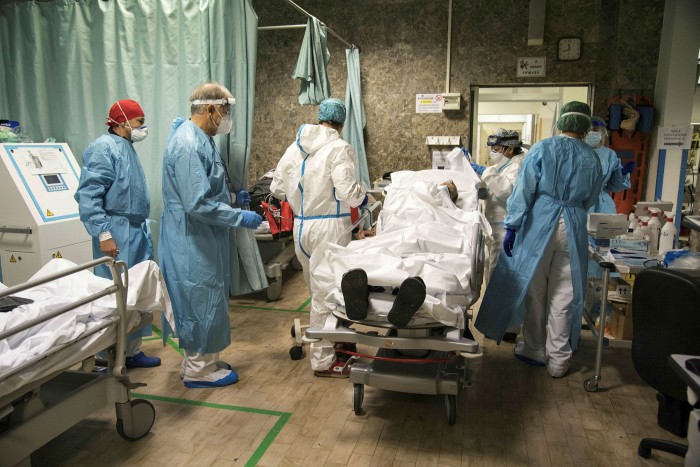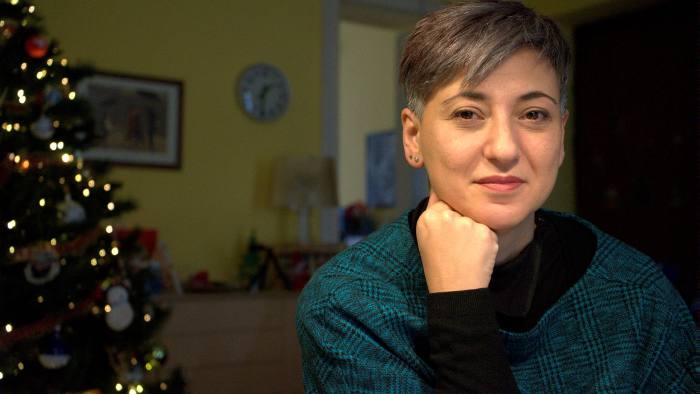‘Patients are arriving too late’: Italy’s cancer sufferers count cost of Covid
Vital treatment is being held up as the crisis consumes health service resources
When Valentina Lombardi suddenly lost her mother to ovarian cancer, she underwent a genetic test to determine her risk of getting the disease.
The 44-year-old wedding planner from the northern Italian city of Turin was told in July she had inherited a dangerous genetic mutation that can spark the rapid onset of cancer, leading to severe illness within weeks. She decided to undergo surgery to remove her ovaries and breasts, lowering the risk of developing the disease by about 90 per cent.
“I was so scared I felt like I was already dying,” said Ms Lombardi. “I knew I had to act immediately to protect my health and my family.”
But with the second wave of coronavirus raging across the country and her hospital’s gynaecology department turned into a Covid-19 unit, Ms Lombardi’s planned surgery has been postponed indefinitely. “I feel lost and abandoned, like many other patients in my situation,” she said.
As the crisis continues to consume resources, health systems across the world are struggling to maintain vital services for other conditions, many of them life threatening, clinicians warn.
“The life and treatment of patients with cancer and other serious illnesses has been affected at every stage, from diagnosis to surgery and chemotherapy, with oncologists forced to make tough choices in unprecedented situations and to limit treatment,” said Francesco Schittulli, president of the Italian League for the Fight Against Cancer, the charity.
“Hospitals are in trouble . . . there are not enough medical staff and the fear has returned. We found ourselves in the abyss again”
Nadia Gasparini, Fight Against Cancer
In the US, the National Cancer Institute, the government research agency, estimates the country will suffer about 10,000 additional deaths from breast and colorectal cancer over the next decade because of the impact of the pandemic on screening and treatment.
The problem in Italy remains acute. It was the first country in Europe to be battered by the coronavirus when it swept across its northern regions in February, with Lombardy for weeks the hardest-hit region on the continent. Chaotic scenes from its overwhelmed hospitals swamped with desperately ill patients and traumatised staff shocked the world. With only a brief summer respite, infections began to soar again in October. In mid-December Italy overtook the UK to register the highest Covid death toll in Europe, at more than 67,000 — the fifth highest in the world.
Strains in the country’s health service, including a shortage of staff and years of cost cutting, had made the situation worse, said Giovanni Leoni, vice-president of FNOMCEO, Italy’s doctors guild.

Medical staff treat a Covid-19 patient in a Genoa hospital. The health crisis has meant 1.4m fewer cancer screening tests were done in Italy in the first five months of 2020 © Luca Zennaro/EPA-EFE/Shutterstock
“The public health sector in Italy has been depleted over recent decades, with fewer and fewer resources in terms of staff and digital technologies and ever-increasing disparities between regions, as well as a lack of a unified approach and poor planning. It is no surprise it was caught unprepared,” he said.
While Italy has now almost doubled the number of intensive care beds from 5,000 to almost 10,000, it has only increased the number of anaesthetists needed to staff them by 5 per cent, he warned.
The impact on patient care has been significant, say doctors. According to the Italian Association of Medical Oncology, an estimated 1.4m fewer screening examinations were performed in the first five months of 2020, compared to the same period the previous year.
Staff shortages as medics were diverted to Covid wards or themselves fell sick have worsened the problem. At the general surgery and transplant department of San Camillo Forlanini hospital, the largest such unit in Rome and which also serves the surrounding region of Lazio, operating theatre capacity has been cut by 30 per cent since the second wave of the pandemic hit.
The result is widespread delays in diagnosis and surgery, including among cancer patients, said Marco Colasanti, an oncology surgeon and senior manager at the facility.
“Many patients [are] arriving too late on the operating table,” he warned. “In recent weeks we have registered unprecedented peaks of up to 40 per cent of patients [whose disease] was no longer operable, due to lack of timely intervention. We were forced to send them back because their cancers had spread too much.”
“Hospitals are in trouble, often patients aren’t able to organise appointments, there are not enough medical staff and the fear has returned. We found ourselves in the abyss again,” said Nadia Gasparini, a doctor at the Italian League for the Fight Against Cancer. “All patients, even the most severe cases who have been guaranteed treatment, are physically and mentally exhausted.”
Anna, a 46-year-old ovarian cancer patient, who is being treated at a leading hospital in the northern Italian city of Genoa, said she felt exasperated and discouraged by the way the health system was being managed.
“I got sick in 2015 and have been treated since then. It has always been hard, but at least before the Covid health crisis doctors and nurses knew who I was, the situation I was in,” she said.
“There was always someone there to offer me a few words of comfort. Now, the medical personnel are exhausted and keep rotating. And patients like me can’t even be accompanied by relatives and friends.
“We’ve all been swallowed up by something that looks a lot like an assembly line, rather than a hospital,” she added. “It’s psychologically devastating.”
Source: Financial Times By Davide Ghiglione in Rome
Support families fighting financial toxicity of cancer – here.
